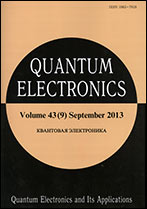|
Lasers
Energy characteristics of a supersonic continuous-wave chemical HF laser using hydrazine decomposition products
I. A. Fedorov
Russian Research Centre "Applied Chemistry", St.-Peterburg
Abstract:
We report the results of calculations and experimental studies of specific energy characteristics of a supersonic cw chemical HF laser with a flat nozzle block corresponding to the nozzle – nozzle reagent mixing scheme, in which catalytic decomposition products of hydrazine N2H4 (H2 + N2 + NH3) are used as a secondary fuel. As a result of experiments with cold (300 K) model mixtures, the specific energy extraction of the laser is found to decrease in this case by 43% compared with the laser utilising pure hydrogen. The calculations show that the main reason for a decrease in the specific energy of the laser is an increase in the temperature in the mixing zone of the oxidising gas and secondary fuel jets. A strong effect of ammonia is revealed. Taking into account the actual heating of the products (up to 1000 K) during the catalytic decomposition of N2H4 allows the level of specific energy extraction from the laser to approach that of energy extraction from the laser operated on pure hydrogen by 13%, which will lead to a decrease in the specific energy extraction by only 30% in the absence of NH3 decomposition products.
Keywords:
supersonic continuous-wave chemical HF laser, secondary fuel, hydrazine decomposition products, ammonia, specific energy characteristics.
Received: 30.09.2019
Citation:
I. A. Fedorov, “Energy characteristics of a supersonic continuous-wave chemical HF laser using hydrazine decomposition products”, Kvantovaya Elektronika, 49:12 (2019), 1163–1167 [Quantum Electron., 49:12 (2019), 1163–1167]
Linking options:
https://www.mathnet.ru/eng/qe17158 https://www.mathnet.ru/eng/qe/v49/i12/p1163
|


|





 Contact us:
Contact us: Terms of Use
Terms of Use
 Registration to the website
Registration to the website Logotypes
Logotypes








